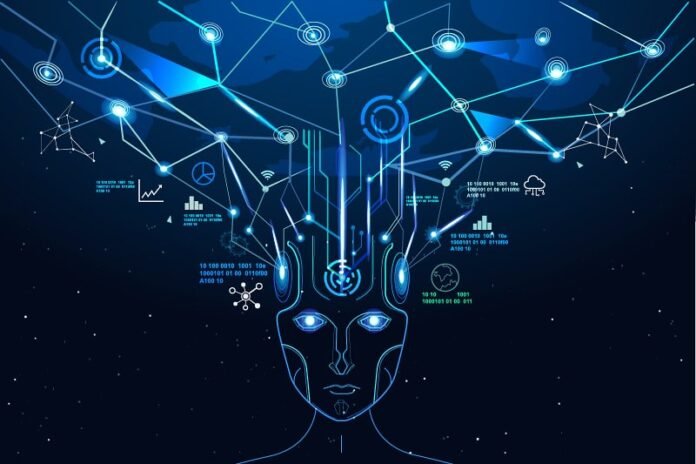Last Updated on February 1, 2026 by Muhammad Binyameen
Table of Contents
What is Artificial Intelligence?
Artificial Intelligence is the simulation of human intelligence in machines programmed to think and mimic human actions. It encompasses many technologies, including machine learning, Artificial Intelligence, natural language processing, and robotics.
The Foundational Role of Artificial Intelligence in Modern Systems
Artificial intelligence (AI) serves as a foundational force in today’s technological landscape by enabling computers and systems to interpret complex data, recognize patterns, and perform tasks that traditionally required human intelligence. At its core, AI leverages machine learning, algorithms, and vast datasets to simulate decision-making processes, allowing systems to adapt and improve over time.
This capacity to learn from experience and generate insights has made AI integral to applications such as voice recognition, predictive analysis, autonomous systems, and data-driven problem solving. By automating repetitive processes and enhancing human capabilities, AI not only increases efficiency but also unlocks new possibilities across different industries, from healthcare diagnostics to intelligent automation in business operations.
Understanding Artificial Intelligence
At its core, AI aims to mimic human intelligence in machines, enabling them to perform tasks that typically require human cognition. This includes learning, problem-solving, reasoning, perception, and language understanding. Artificial intelligence (AI) systems are made to analyze enormous volumes of data, spot trends, and make decisions with the least amount of human input.
The Evolution of Artificial Intelligence
The concept of artificial intelligence dates back to ancient times, with early philosophical debates on the nature of thought and consciousness. However, significant advancements in AI began in the 20th century with the development of digital computers and the emergence of pioneers such as Alan Turing and John McCarthy. Since then, AI has evolved rapidly, driven by breakthroughs in machine learning, neural networks, and deep learning algorithms.
Historical Background
The concept of AI dates back to ancient times, but significant advancements were made in the 20th century with the development of computers and programming languages.
Applications of Artificial Intelligence
AI finds application across diverse fields, including:
Healthcare
AI is revolutionizing diagnostics, personalized medicine, drug discovery, and patient care in healthcare. AI-powered systems analyze medical images, predict disease outbreaks, and assist in surgical procedures, leading to improved healthcare outcomes and efficiency.
Finance
Artificial Intelligence is utilized in the financial industry for risk assessment, algorithmic trading, fraud detection, and customer support. AI algorithms analyze real-time financial data, detect fraudulent transactions, and provide personalized investment advice, enhancing accuracy and decision-making processes.
Education
In education, AI enhances learning experiences through personalized tutoring, adaptive learning platforms, and educational software. AI-powered tools cater to individual student needs, track learning progress, and provide instant feedback, optimizing learning outcomes and engagement.
Transportation
AI is used in transportation to power predictive maintenance, route optimization, autonomous vehicles, and traffic management systems. AI algorithms analyze traffic patterns, predict congestion, and optimize transportation routes, revolutionizing our travel and commute.
Read More: Lil Marlo Net Worth: The Promising Rapper Whose Untimely Passing Cut Short His Rise…
How Artificial Intelligence Works
AI operates through various mechanisms, including:
Machine Learning
Machine learning algorithms enable computers to learn from data, identify patterns, and make predictions without explicit programming, driving advancements in AI applications.
Neural Networks
Inspired by the human brain, neural networks are AI models composed of interconnected nodes that process information and perform tasks such as image recognition, speech synthesis, and natural language understanding.
Natural Language Processing
Natural language processing enables computers to understand, interpret, and generate human language, facilitating communication between humans and machines through voice assistants, chatbots, and language translation tools.
AI poses several challenges and concerns, including:
Ethical Concerns
Ethical dilemmas arise concerning AI’s impact on privacy, security, and human rights, prompting responsible AI development and usage discussions.
Job Displacement
The automation of tasks by AI raises concerns about job displacement and the future of work, necessitating reskilling and upskilling initiatives to adapt to changing employment landscapes.
Bias and Fairness
AI systems may perpetuate biases present in training data, leading to unfair outcomes and discrimination. This highlights the importance of mitigating bias and ensuring algorithmic fairness.
Challenges and Opportunities
While AI offers tremendous opportunities, it also poses several challenges and concerns. These include ethical dilemmas regarding AI’s impact on privacy, security, and human rights and concerns about job displacement and algorithmic bias. However, with proper regulations, ethical guidelines, and responsible AI development practices, these challenges can be addressed, and the full potential of AI can be realized for the benefit of society.
Future of Artificial Intelligence
The future of AI holds immense potential for:
Advancements and Innovations
Continued research and development in AI promise breakthroughs in areas such as quantum computing, explainable AI, and AI ethics, shaping a more intelligent and ethical future.
Impact on Society
AI’s impact on society will continue to evolve, influencing industries, economies, and daily life. Harnessing its benefits responsibly will necessitate ethical frameworks, regulations, and societal adaptations.
Conclusion
In conclusion, Artificial Intelligence represents a transformative force with profound societal implications. From healthcare to finance, transportation, and education, AI permeates every aspect of modern life, offering unprecedented opportunities and challenges. As we navigate the complexities of AI, it is imperative to prioritize ethical considerations, address societal concerns, and embrace innovation responsibly to realize its full potential for the betterment of humanity.
Apart from that, if you want to know about Maximizing Meeting Impact Then please visit our Technology category.
FAQs
AI is present in virtual assistants like Siri and Alexa, recommendation systems on streaming platforms, and personalized ads on social media.
While AI may automate specific tasks, it also creates new job opportunities in data science, AI research, and AI ethics.
Researchers and organizations are developing techniques such as algorithmic auditing and fairness-aware machine learning to mitigate AI bias.
AI can automate some tasks but also creates new roles and opportunities.
When properly designed and managed, AI systems are generally safe and reliable.



























